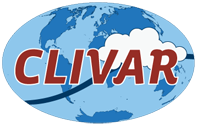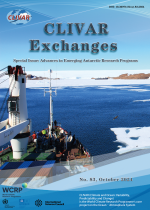The 48th Liege Colloquium on Ocean Dynamics
Terms Of Reference
A rich tapestry of oceanic processes is manifest at scales O(0.1-10 km), small enough for the constraints of the earth’s rotation and oceanic stratification to be overcome, but larger than that of three-dimensional turbulence. Rossby and Richardson numbers of O(1) lead to a range of dynamical instabilities that respond to surface forcing and boundary stresses, and interact with the mesoscale flow field, upper ocean turbulence, and near-inertial waves. These dynamics result in enhanced vertical velocities and mixing, as well as stratification, on time scales that range from a few days to the inertial period and intersect with the time scales of internal waves and tides.
Their diagnoses is facilitated through advances in high-resolution autonomous, in-situ and remotely sensed observations, modeling, and theoretical advances. Their implications are wide-ranging and include the transfer of energy across scales, lateral mixing and transport, restructuring of the upper ocean’s density and stratification, modulation of air-sea, ice-ocean, ocean-bathymetric interactions, the exchange of biogeochemical properties across the mixed layer base, vertical supply of nutrients for primary production, modulation of light exposure and growth rates for phytoplankton, subduction of surface water, and export of particulate organic carbon and oxygen from the surface mixed layer. The similarity of physical and biological time scales of phytoplankton growth heightens the relevance of submesoscale processes for the production and export of phytoplankton, and the structuring and diversity of oceanic ecosystems.
This colloquium aims to advance our collective understanding of submesoscale processes, their mechanistic functioning, relevance, and implications across a range of oceanic disciplines. Discussions will include observational, modeling and theoretical approaches for elucidating submesoscale phenomena. From this colloquium, its oral/poster presentations and scientific interactions, will emerge new cross-cutting themes for future research.
Topics that will be addressed include:
- Dynamics of frontal and mixed-layer instabilities (forced and unforced) and their implications.
- Impact of winds and surface forcing on the mixed layer and submesoscale instabilities.
- Surface boundary layer turbulence and submesoscale instabilities, large-eddy simulation and observations of surface waves, Langmuir circulations. Their implications for air-sea coupling.
- Surface signatures of submesoscale dynamics from remotely sensed surface topography, roughness, and ocean color.
- Mesoscale-submesoscale interactions, energy cascades, impact of submesoscales on larger/smaller scales
- Physical-biological interactions — implications for biogeochemistry, productivity, export, ecosystem structure and diversity
- Freshwater in the oceans — implications of submesoscale processes for sea ice, river plumes and freshwater dispersal
- Coastal submesoscale dynamics — interaction with topography and the bottom boundary
- Wave-front/eddy interactions Interaction of internal waves and submesoscale fronts/ eddies
- Modelling issues related to multi-scale and multi-physics nature of the processes and in particular model nesting, unstructured grids and developments of new discretization schemes.
Organisers
- Alexander Barth, ULg, Belgium
- Amala Mahadevan, WHOI, USA
- Ananda Pascual, IMEDEA (CSIC-UIB), Spain
- Simon Ruiz, IMEDEA (CSIC-UIB), Spain
- Charles Troupin, SOCIB, Spain
Scientific Committee
The scientific committee is composed by the organisers and by the following scientists:
- Jean-Marie Beckers, ULg, Belgium
- Jérôme Benveniste, ESA, Italy
- Paolo Callil, FURG, Brazil
- Arthur Capet, OGS, Italy
- Mariona Claret, McGill, Canada
- Eric D’Asaro, U. Washington, USA
- Eric Deleesnijder, UCL, Belgium and TU Delft, The Netherlands
- Baylor Fox-Kemper, Brown University, USA
- Lee-Lueng Fu, JPL, USA
- Johannes Karstensen, U. Kiel Geomar, Germany
- Patrice Klein, LPO, France
- Marina Lévy, LOCEAN/IPSL, France
- Jen MacKinnon, UCSD, USA
- Rosemary Morrow, LEGOS, France
- Alberto Naveira-Garabato, NOC, UK
- Antonio Olita, CNR, Italy
- Sebastiaan Swart, CSIR, South Africa
- Amit Tandon, UMass Dartmouth, USA
- Jacques Verron, LGGE, France
Confirmed Keynote Speakers
- Xavier Capet, LOCEAN, France
- Lee-Lueng Fu, JPL, USA
- Robert Hetland, TAMU, USA
- Karen Heywood, UEA, UK
- Marina Lévy, LOCEAN/IPSL, France
- Jim McWilliams, UCLA, USA
- Remko Scharroo, Eumetsat, Germany
- Leif Thomas, Stanford University, USA
Travel Grants
Travel grants are available for scientists with original contributions to the topics covered by the colloquium. Early career scientists such as PhD students and early post-docs as well as scientists from low-income countries are particularly encouraged to apply. No later than the 24th January 2016, interested scientists should,
- submit an abstract on which they are first author online and
- provide their CV by filling the form, except for US-scientists who use the following form.
The scientific committee will base their decision on the following criteria:
- scientific originality of abstract
- fitness to the scientific programme
- originality of previous work (this criterion may not be applicable for very early career stage scientists)
The travel grants can cover the cost of travel (economy class airline or train tickets), accommodation and the registration fee. The sponsorship from ESA, CNES, IOC and SOCIB will allow to reimburse actual costs upon presentation of original receipts (with a ceiling depending on the number of applications and the country of origin), after the colloquium. US-scientists can get a travel grant of 2000 $ (thanks to special funding from NASA and ONR).
All applicants will be notified of the outcome of the selection by email at the end of February 2016. If their application is not selected, the abstract can be withdrawn within one week of the receipt of the outcome of the travel grant selection. In this case, an email should be sent to oceanphys@ulg.ac.be with the title of the abstract to be withdrawn.
Special Issue
A special issue will be published in Ocean Dynamics with contributions from the authors participating in this colloquium.
Contributions from first author of an oral or poster presentation during the colloquium are welcome.
Registration
You can register to the 48th Liege Colloquium by filling the form here













